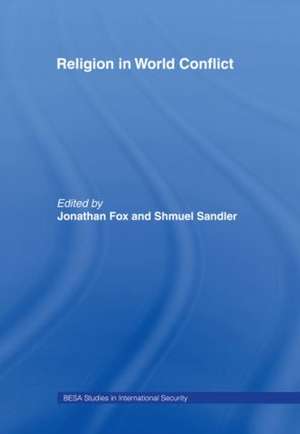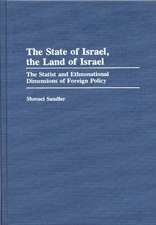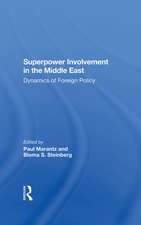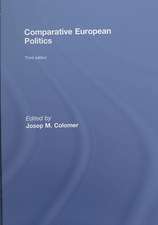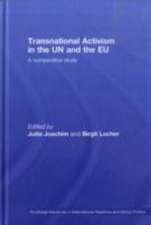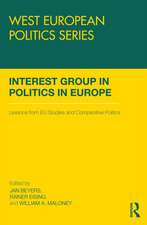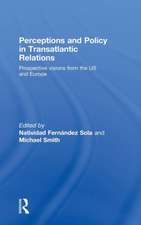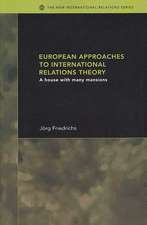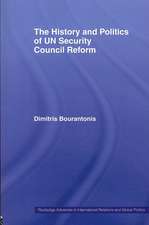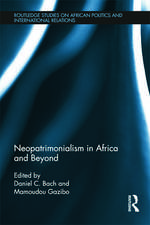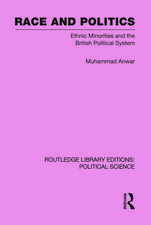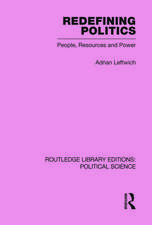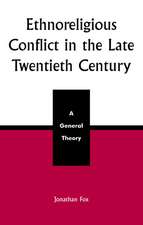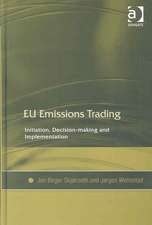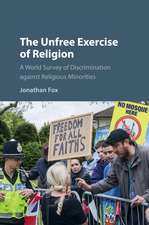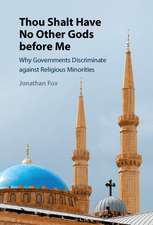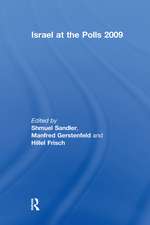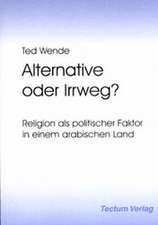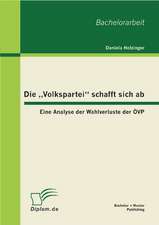Religion in World Conflict: Besa Studies in International Security
Editat de Jonathan Fox, Shmeul Sandleren Limba Engleză Hardback – 20 iul 2006
Each of these leading authors addresses different aspects of these questions in different contexts providing a diverse and multifaceted view of the topic.
Susanna Pearce and Tanja Ellingsen examine the religious causes of conflict on the macro-level. Several of the contributors focus on specific conflicts. The Gaurav Ghose and Patrick James examine the Kashmir conflict from the Pakistani perspective and Carolyn James and Ozgur. Ozdamar examine it from the Indian perspective. Similarly Hillel Frisch examines the Palestinian-ISraeli conflict from the Palestinian perspective and Jonathan Rynhold examines it from the Israeli perspective. Finally, two of the authors examine other important issues. Stuart Cohen examines the evolution of the religious view of war in the Jewish tradition and Yehudit Auerbach examines whether can play a role in conflict resolution and reconciliation. These assessments deliver fascinating conclusions.
This book was previously published as a Special Issue of Terrorism and Violence.
| Toate formatele și edițiile | Preț | Express |
|---|---|---|
| Paperback (1) | 398.82 lei 6-8 săpt. | |
| Taylor & Francis – 24 dec 2007 | 398.82 lei 6-8 săpt. | |
| Hardback (1) | 949.60 lei 6-8 săpt. | |
| Taylor & Francis – 20 iul 2006 | 949.60 lei 6-8 săpt. |
Preț: 949.60 lei
Preț vechi: 1158.05 lei
-18% Nou
Puncte Express: 1424
Preț estimativ în valută:
181.73€ • 189.03$ • 150.03£
181.73€ • 189.03$ • 150.03£
Carte tipărită la comandă
Livrare economică 15-29 aprilie
Preluare comenzi: 021 569.72.76
Specificații
ISBN-13: 9780415371674
ISBN-10: 0415371678
Pagini: 196
Dimensiuni: 174 x 246 x 22 mm
Greutate: 0.56 kg
Ediția:New.
Editura: Taylor & Francis
Colecția Routledge
Seria Besa Studies in International Security
Locul publicării:Oxford, United Kingdom
ISBN-10: 0415371678
Pagini: 196
Dimensiuni: 174 x 246 x 22 mm
Greutate: 0.56 kg
Ediția:New.
Editura: Taylor & Francis
Colecția Routledge
Seria Besa Studies in International Security
Locul publicării:Oxford, United Kingdom
Cuprins
1. The Question of Religion in World Politics Jonathan Fox, Bar Ilan University and Shmuel Sandler Bar Ilan University 2. Forgiveness and Reconciliation: The Religious Dimension Yehudit Auerbach, Bar Ilan University 3. The Changing Jewish Discourse on Armed Conflict: Themes and Implications Stuart Cohen, Bar Ilan University 4. Towards a Revival of Religion and Religious Clashes? Tanja Ellingsen, Norwegian University of Science and Technology 5. Third Party Intervention in Ethno-Religious Conflict: Role Theory, Pakistan, and the War in Kashmir Gauvav Ghose, University of Missouri-Columbia, Patrick James, University of Missouri-Columbia 6. Religion as a Factor in Ethnic Conflict: Kashmir and Indian Foreign Policy Carolyn James, Stephens College, Ozgur Ozdamar, University of Missouri-Columbia 7. Has the Israeli-Palestinian Conflict Become Islamic? Fatah, Islam, and the Al-Aqsa Martyrs Brigade Hillel Frisch, Bar Ilan University 8. Religion, Postmodernisation and Israeli Approaches to the conflict with the Palestinians Jonathan Rynhold, Bar Ilan University 9. Conflict over Israel: The Role of Religion, Race, Party and Ideology in the U.S. House of Representatives, 1997-2002 Kenneth Wald, University of Florida, Elizabeth Oldmixon, University of North Texas, and Beth Rosenson, University of Florida 10 Religious Rage: A Quantitative Analysis of the Intensity of Religious Conflicts Susanna Pearce, Trinity College
Notă biografică
Jonathan Fox is currently a senior lecturer in the Political Studies Department of Bar-Ilan University and a senior research fellow at the Begin-Sadat Center for Strategic Studies., Shmuel Sandler is currently The Sara and Simha Lainer Professor in Democracy and Civility, Department of Political Science, Bar-Ilan University, and a senior research fellow at the Begin-Sadat Center for Strategic Studies.
Descriere
This new book tackles two crucial questions: First, how does religion in its various forms and manifestations influence world politics? Second, how will adding religion to the discourse on international relations modify our theoretical understanding?
